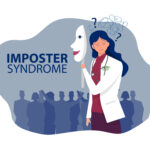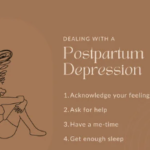When we think of childbirth, we often imagine the joy of bringing new life into the world. But for many mothers, this experience is overshadowed by an emotional and psychological struggle that often goes unnoticed: postpartum depression (PPD). In African communities, where cultural norms often silence discussions around mental health, this condition can be both misunderstood and stigmatized. PPD could be more pronounced in women or men with autism spectrum disorder with challenges in navigating the complexity of childbirth and change in routine (pohl et al, 2020). Parents on the spectrum may exhibit high mutism, priotizing task and mutiltasking which in the long run lead to stress and anxiety.
Yet, as more African mothers, like Adeola Dorcas Folorunso, step forward to advocate for change, there is hope that awareness, education, and proper care can mitigate the effects of PPD, offering practical ways for families to navigate this challenge together.
What Are “Baby Blues,” Postpartum Depression, and Psychosis?
You may have heard the term “baby blues” in reference to the emotional ups and downs many women experience after childbirth. It’s normal to feel overwhelmed or fatigued in the days following delivery, but for some, these feelings don’t fade.
Instead, they develop into postpartum depression (PPD), a more severe mental health condition that affects an estimated 10-20% of women worldwide within the first year of giving birth.
A recent publication in the South African Medical Journal (SAMJ) highlighted concerning statements made by a clinical psychologist and professor from a leading South African university during an interview on a popular radio station. The discussion focused on the recent approval by the U.S. Food and Drug Administration (FDA) of a new drug to treat postpartum depression (PPD). Unfortunately, the interview included several pieces of misinformation and potentially harmful attitudes regarding PPD that could negatively impact pregnant and postpartum women, as well as their families.
The psychologist incorrectly stated that PPD is not a biological condition, asserting, “All the research indicates that postpartum depression is not a biological condition; it doesn’t have to do with hormones, for instance.”
This statement is not supported by current scientific understanding. Leading research consistently identifies a complex interaction between hormonal changes, genetics, and environmental factors in the development of PPD.
In Africa, where access to mental health services is limited and stigma runs deep, PPD can go unrecognized, exacerbating its impact on mothers and families.
PPD involves feelings of extreme sadness, anxiety, and a lack of interest in daily activities, including bonding with the newborn. Unlike the baby blues, PPD lasts for more than two weeks and requires professional intervention.
At the far end of the spectrum lies postpartum psychosis, a rare but severe condition that can lead to disorganized thinking, hallucinations, and suicidal thoughts. Understanding these conditions and recognizing the signs early on can prevent devastating outcomes.
Risk Factors for Postpartum Depression in Africa
In Africa, the risk factors for developing PPD are often intertwined with cultural, social, and economic challenges. Limited access to mental health resources and the lack of a robust healthcare infrastructure make it difficult for mothers to seek the help they need.
Additionally, the social expectations of motherhood in many African communities place immense pressure on women to be “strong” and to fulfill their roles without complaint.
Financial instability, lack of social support, and the stigma surrounding mental health further contribute to the risk. For many African mothers, childbirth is an emotionally and physically taxing experience, and without proper psychological and financial preparation, the likelihood of developing PPD increases.
Adeola Dorcas Folorunso, a registered nurse, mental health advocate, and founder of Matermental, a non-governmental organization (NGO) dedicated to maternal health, highlights these risk factors in her work. Adeola’s personal and professional journey reveals the intersection of these challenges, emphasizing the importance of community-based solutions to combat PPD.
Signs and Symptoms of Postpartum Depression: What to Watch For
As you or someone you know navigates the postpartum period, it’s essential to understand the signs and symptoms of PPD. While every individual’s experience may vary, common symptoms include persistent sadness, feelings of guilt or worthlessness, difficulty concentrating, insomnia or excessive sleeping, and a lack of interest in the baby.
You may feel isolated, overwhelmed by simple tasks, or find it difficult to connect with your newborn. Physical symptoms like weight changes, fatigue, and headaches can also manifest.
Recognizing these symptoms in yourself or others is critical. If left untreated, PPD can worsen, affecting not just the mother’s mental health but also her physical well-being and the infant’s development.
The Importance of Financial and Psychological Preparedness
The financial and emotional toll of childbirth can be overwhelming, especially in countries where resources are scarce. Adeola’s work highlights the critical role of financial and psychological preparedness in preventing PPD.
While many African families focus on preparing financially for the birth, the psychological preparation often falls short. Understanding that the transition to motherhood involves emotional adjustments is crucial.
In her virtual community outreach program, Adeola emphasizes the importance of financial planning before childbirth, including ensuring access to healthcare and support systems.
But just as important is preparing mentally for the changes that come with raising a child. It’s not just about the baby; it’s about the parent’s emotional well-being too. Programs that provide psychological support, such as counseling and peer support groups, can make a significant difference in reducing the incidence of PPD.
Cultural and Religious Impact on Postpartum Depression
Culture and religion play a significant role in shaping the way postpartum depression is viewed and addressed in African communities.
While some African cultures provide strong familial support to new mothers, others may view mental health struggles as a taboo or weakness. In many cases, the pressure to conform to cultural expectations of motherhood can prevent women from acknowledging or seeking help for PPD.
Never forget that religious beliefs can offer both positive and negative influences on PPD. Some faith-based communities provide emotional support, prayer, and encouragement, which can help women feel less isolated.
However, in some instances, religious communities may stigmatize mental health issues, viewing them as a spiritual or personal failing. This creates barriers to accessing mental health care.
Adeola, through her work with Matermental, advocates for culturally sensitive approaches to maternal health. She understands the importance of balancing cultural and religious beliefs with the need for mental health care, pushing for a more open dialogue around mental illness in African communities.
The Gender Imbalance: Why Men Are Often Neglected in Postpartum Discussions
While the focus is often on mothers, fathers are also affected by the challenges of postpartum life. The pressures of providing financially, adjusting to fatherhood, and supporting a partner with PPD can take a toll on men’s mental health. Yet, men are frequently excluded from conversations about postpartum care.
In Adeola’s research, many fathers expressed feeling neglected or underprepared for the emotional strain of fatherhood, even as they tried to support their partners. The emotional and physical demands of parenting can lead to anxiety, stress, and even depression in men, but because PPD is often framed solely as a women’s issue, fathers may not recognize the need for help or feel comfortable seeking it.
Incorporating fathers into conversations about PPD is essential. A supportive partner is crucial for the recovery of a mother, and equally, fathers need to be equipped with the tools to cope with their own emotional struggles. Encouraging open communication and education for both parents can lead to better outcomes for the entire family.
Misconceptions and Stereotypes Around Postpartum Depression
In many African communities, PPD is surrounded by misconceptions. It is often perceived as a rare or foreign condition, with many people dismissing it as a sign of weakness or poor character.
These stereotypes can prevent women and men from seeking help, fearing judgment or ridicule. The stigma around PPD also leads to the idea that it will simply “pass” on its own, which can delay treatment and make the situation worse.
Adeola’s Beyond Baby Blues summit openly address these misconceptions and encourages people to seek for help . By bringing together experts and community members, the summit fostered a conversation about mental health that destigmatized PPD and empowered women to speak up about their struggles.
Adeola’s work emphasizes that PPD is a medical condition that requires professional attention, just like any other illness.
The Mental Health Implications of Stigmatization Around Postpartum Depression
The stigma surrounding PPD can have severe mental health implications. When mothers feel ashamed or isolated because of their condition, it can worsen their depression, leading to a cycle of despair.
Mental health conditions, when left untreated, can affect not only the individual but also the family dynamics, child development, and community well-being.
A culture of acceptance and understanding is essential to breaking this cycle. Public education campaigns, such as Adeola’s outreach programs, are vital in changing the narrative around postpartum mental health in Africa.
These efforts help normalize the conversation, reduce stigma, and encourage women and families to seek support without fear of judgment.
The Role of Public Health Professionals in Addressing Postpartum Depression
Public health professionals play a crucial role in addressing PPD at both the local and international levels. By providing education, resources, and screenings, they can help mothers recognize the signs of PPD early and connect them with the necessary care.
Public health campaigns that focus on maternal mental health can help increase awareness, while healthcare workers can be trained to identify PPD symptoms and provide appropriate support.
Adeola’s advocacy for better healthcare policies highlights the importance of integrating mental health services into maternal care right from the day of conception.
By focusing on maternal, paternal, and child health in a comprehensive way, public health professionals can make a significant impact in reducing the prevalence of PPD and improving the overall quality of life for families.
Conclusion: Moving Forward—A Call to Action
As African families continue to face the challenges of postpartum depression, we must take proactive steps to address this issue especially for families with underlying neurodivergent conditions . Screening and early interventions should commence from moment of conception.
Adeola Dorcas Folorunso’s work demonstrates the power of education, community support, and policy change in tackling PPD.
Whether through financial preparation, mental health screenings, or open conversations about the emotional toll of parenthood, there are practical ways to reduce the incidence and impact of PPD.
It’s time to break the silence, confront the stigma, and support mothers, fathers, and families in their journey toward mental health and well-being. Together, we can create a world where maternal mental health is no longer an afterthought but a central focus of our healthcare systems and communities.
References
Reference:
- Common Misconceptions About Postpartum Depression – https://www.webmd.com/depression/postpartum-depression/common-misconceptions
- Postpartum depression: Addressing misinformation and harmful attitudes – https://www.scielo.org.za/scielo.php?script=sci_arttext&pid=S0256-95742023000900001
- Pohl AL, Crockford SK, Blakemore M, Allison C, Baron-Cohen S. A comparative study of autistic and non-autistic women’s experience of motherhood. Mol Autism. 2020 Jan 6;11(1):3. doi: 10.1186/s13229-019-0304-2. PMID: 31911826; PMCID: PMC6945630.
- Risk Factors of Postpartum Depression – https://pmc.ncbi.nlm.nih.gov/articles/PMC9711915/




















One Response
We are happy to know your thought.